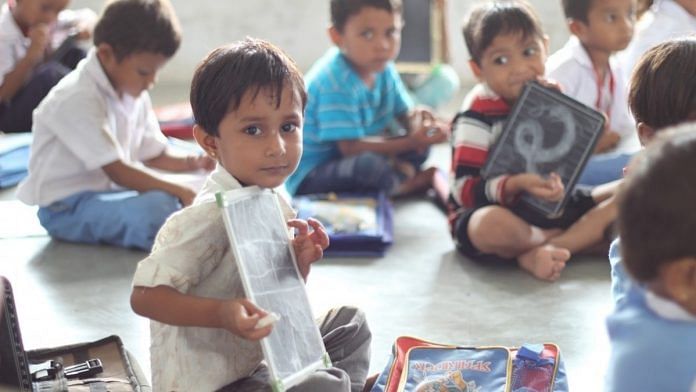New Delhi: The National Council for Educational Research and Training (NCERT) has come up with a three-month long school preparation module for children in the 6-7 age group. It aims to impart basic number and language skills before the children begin formal school.
In India, formal schooling begins after the age of 6 when the child is in Grade 1. She is considered to be in pre-school level prior to that.
The module called ‘Vidya Pravesh’ is a part of ‘Nipun Bharat’ — Modi government’s latest scheme to improve foundational literacy and numeracy among young children. Prime Minister Narendra Modi officially launched it last month. The NCERT issued detailed guidelines for it this week.
The play-based module that NCERT has developed is in line with the new National Education Policy, which talks about preparing children for the formal school system.
The module’s purpose is to “ensure every child attains foundational literacy and numeracy by the end of Grade-III, and not later than Grade-V, by 2025”. It intends to “create a stimulating learning environment that is joyful, safe, ensures emotional security and provides support to all the children in school and at home”.
Also read: We need to ‘disrupt’ educational systems to help children be ready for future jobs
Mother tongue, activities — what the rules say
The guidelines call for providing opportunities for children to talk in the classroom in their mother tongue for communication and instructions.
“Children learn language by listening and speaking before they learn to read and write. Even before they enter school, they acquire vocabulary from their immediate environment. In the classroom, it is important to expose children to the language through listening and speaking,” the guidelines say.
Use activities like conversations, discussions, sharing of experiences, feelings and ideas, asking and answering questions, using simple instructions, etc, it adds.
The rules say that tutors should sing rhymes and songs; read aloud to the children; play games; engage children in drama or role-play and dialogue.
It also suggests labeling various objects in the room such as ‘door’, ‘window’ and ‘almirah’ — so that children understand how to use those words in a conversation — and developing a separate language area and a numbers area in school.
“Keep letter magnets, foam letters and letter blocks available in the language area,” it adds.
Ask children to engage with functional print like attendance charts, calendars, etc, and change the displays often, it says.
“It is important to plan the daily routine and transaction plan for an early numeracy programme to make it vibrant, engaging and full of play and activities,” the guidelines say.
It suggests an appropriately designed classroom arrangement, which should have a well-resourced mathematics and numeracy area having stackable equipment; a variety of items for children to sort and match; objects of different shapes, sizes, colours, measuring tapes; pens; paper; rulers; calculators and magnetic numbers, etc.
By the end of three months, among other things, children should be able to understand colours, shapes, distance, measurement, size, length, weight, height, time, spatial sense, and one-to-one correspondence. They should be able to recognise numbers, count and tell, be able to listen with comprehension, start developing vocabulary and using language meaningfully.
Also read: DU to implement 4-yr UG programme from 2022, giving students multiple entry-exit options



